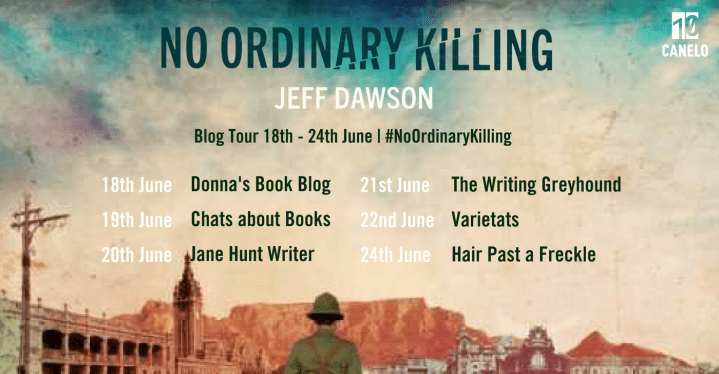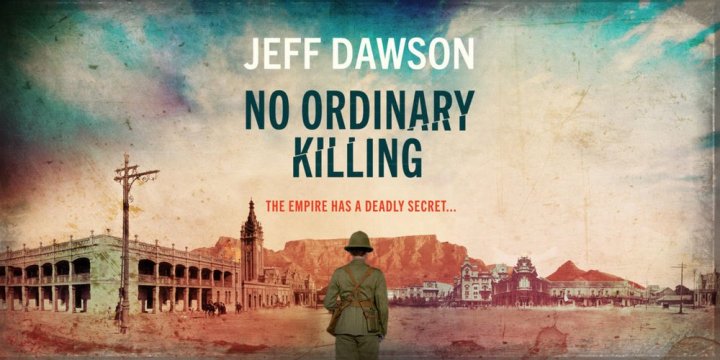Hi all!
Today I have the pleasure of joining in with Jeff Dawson’s No Ordinary Killing blog tour!

Many thanks to Ellie Pilcher, at Canelo, for the opportunity to take part.
Title: No Ordinary Killing
Author Name: Jeff Dawson
Previous Books (if applicable): N/A
Genre: Historical Crime, Mystery Thriller
Release Date: 28th May 2018
Publisher: Canelo
Cover Image: 
Book Blurb: The Empire has a deadly secret…
1899, South Africa: As the Boer War rages, Captain Ingo Finch of the Royal Army Medical Corps pieces together casualties at the front. Then, recovering in Cape Town, he is woken by local police. A British officer has been murdered, and an RAMC signature is required for the post-mortem.
Shocked by the identity of the victim, the bizarre nature of the crime and what appears a too-convenient resolution, Finch turns detective. He is soon thrust into a perilous maze of espionage and murder.
Along with an Australian nurse, Annie, and an escaped diamond miner, Mbutu, Finch finds he has stumbled on a terrifying secret, one that will shake the Empire to its core…
An extraordinary and unputdownable historical crime thriller and Kindle bestseller, perfect for readers Philip Kerr, M.J. Carter and Abir Mukherjee.
Links to Book:
Author Bio:
Jeff Dawson is a journalist and author. He has been a long-standing contributor to The Sunday Times Culture section, writing regular A-list interview-led arts features (interviewees including the likes of Robert De Niro, George Clooney, Dustin Hoffman, Hugh Grant, Angelina Jolie, Jerry Seinfeld and Nicole Kidman). He is also a former US Editor of Empire magazine.
Jeff is the author of three non-fiction books — Tarantino/Quentin Tarantino: The Cinema of Cool, Back Home: England And The 1970 World Cup, which The Times rated “truly outstanding”, and Dead Reckoning: The Dunedin Star Disaster, the latter nominated for the Mountbatten Maritime Prize.
Author Photo: 
Author Social Media Links
Twitter: @jeffdaw
Guest post…..
No Ordinary Killing and the Boer War
A few years ago I lived on a street called Ladysmith Road. It joined another one called Kimberley, both thoroughfares of solid, red-brick terracing. Show me any British suburb built around 1900 and I will give you roads called Ladysmith and Kimberley, Mafeking too – named after towns besieged, then jubilantly relieved, during the Boer War – officially Second Boer War – of 1899-1902.
There’s evidence enough that the Boer War was deeply etched into late-Victorian/early-Edwardian society. The reminders live on – in those steep “Kop” ends at football grounds (most famously at Liverpool FC); in the good old Boy Scouts, set up by a general (Baden-Powell) to inspire and improve army recruiting.
At the war’s peak, a staggering half a million men – half a million – had flooded into South Africa from around the Empire, the then-biggest military expedition in history. It was the Vietnam War of its day, in which the might of the world’s pre-eminent Superpower was brought to bear upon a vastly outnumbered, supposedly ragtag foe – in this case a bunch of upstart, Dutch-descended settlers.
Today, in Britain country (but not in South Africa), the Boer War has slipped to a historical footnote. Firstly, it was an embarrassment, one internationally condemned – a lop-sided affair in which a vaunted brief victory ended up taking a brutal two-and-a-half years, with thousands of Boer women and children perishing in that brand new construct, the “concentration camp”. Secondly, just twelve years later, came the Great War, a conflict so cataclysmic, and so much closer to home, that this colonial rumble in a far-flung corner of the British Empire became eclipsed.
The causes of the Boer War are complex, its prosecution complicated. But it remains notable for a number of reasons. It began with military tactics redolent of the Napoleonic Wars but ended with the machine guns, trenches and barbed wire that would later become a feature of the Western Front. The war marked the first time that countries like Australia, New Zealand, India and Canada had acted upon the international stage. It was also the first great media war in which the telegraph and telephone were key components; a war that was both photographed and filmed and in which public opinion played a huge part, influenced by “embedded” reporters like Winston Churchill. Not all reaction was positive. It was the first time the Government had had to contend with a substantial anti-war movement.
Importantly, it was also a proxy war, a dress rehearsal for a looming Armageddon. The Boers, armed by the Germans, included all manner of anti-imperial foreign mercenaries in their ranks. Progress was monitored eagerly by American, French and Russian observers. To more sinister end, the African veld became a killing field, a testing ground for battlefield horrors as yet unimaginable.
No Ordinary Killing is not about the Boer War but is a murder mystery, a thriller, set against its backdrop. Away from the military action, Cape Town here is a heaving, exotic port, with thousands of soldiers passing through, either on their way up to the Front, or on leave from it, and the local police hard-pushed to cope. Behind the genteel veneer, it is a city of bars, bordellos, conmen and a crime wave, with a lid clanging on a simmering pot of ethnic tension.
My story gets going when a British Army officer is found dead one night, killed under seemingly strange circumstances, his body dumped on the veranda of his guesthouse. Which is where Captain Ingo Finch comes into the picture. A doctor with the newly formed Royal Army Medical Corps – with the army, but not of the army – he is summoned to sign off on a post mortem, the officer’s death falling between the jurisdictions of the over-burdened Cape Constabulary and the Military Foot Police. The identity of the victim and the swift, too-tidy resolution to the case, prompts Finch to do a bit of amateur sleuthing. Pretty soon our unwitting hero is caught in a web of deadly intrigue and espionage as the machinations of military intelligence click into gear around him.
To me there’s nothing more dramatic than someone thrust in way over their head, plunged into a life-or-death struggle, having to figure out the rules of the game on the hoof (alongside, in this case, a rather feisty accomplice, an Australian nurse called Annie Jones and a refugee diamond mine worker called Mbutu). I very much enjoyed writing it. I do hope you enjoy reading it.
Jeff Dawson